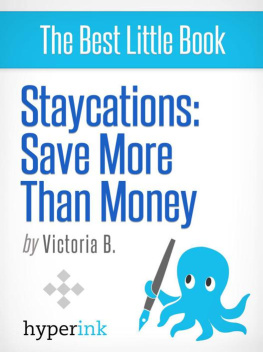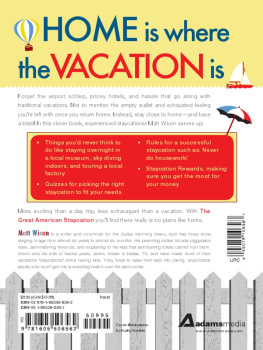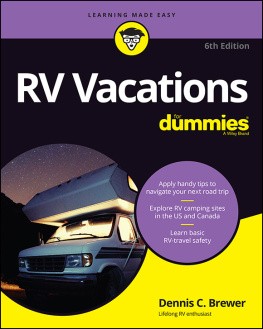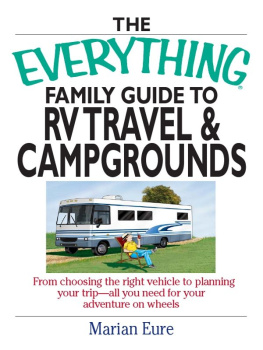Staycations: Save More Than Money
Introduction
Staycations may not be a new concept, but they are quickly becoming a trendy alternative to spending time off work in hotels, cabins or on the road. A staycation, at the heart, is a vacation held in your home. You may indulge in restaurant fare, visit local tourist attractions or simply lounge around resting and reading books, but you do it in the comfort of your own house.
Thousands of American families are giving up on the idea of driving or flying to faraway locations to take their annual vacation. Between busy family schedules and the state of the economy, more and more families are opting to spend their time off work at home, exploring the sites nearby and simply relaxing in their own house and yard. While economics is the main reason many of these families opt for a staycation, you save a number of other things by staying home instead of going on the road.
Physically, it may be more comfortable to spend your vacation time at home. You can sleep in your own bed, cook your own food or eat at familiar restaurants and avoid the germs from thousands of people who you might otherwise meet at a crowded vacation spot.
You can save many things emotionally, as well. You'll avoid stressful crowds, dealing with unpleasant strangers, getting lost and the disappointment of expensive dreams not panning out. There is a lot to be said for spending pleasant time in familiar surroundings; this is one reason time-share vacations are so popular. If you cut out most of the stressful situations likely to happen during a vacation far away from home, you're much more likely to end the week rested and refreshed.
A staycation can be much less expensive than flying to an exotic location and indulging in luxuries all week long, but it doesn't have to be an austere program of discount meals and no entertainment. Eat in restaurants and visit interesting spots close to home during your staycation to keep things interesting and to reward yourself for a job well done. The idea of a vacation is to indulge and enjoy, to recharge your mental batteries before going back to work at the end of the week. Treat yourself to some indulgences and you'll save money, time and lot more during the week.
Save Your Car
Much like in the Baby Boomer generation of the 60s and 70s, many of today's families opt to go on road trips for vacation instead of flying to their destination. Depending on the number of people in your family, this may save you a significant amount of money. However, it still puts a large amount of wear and tear on your automobile. If you take your main family car or, worse yet, your only car for a vacation road trip, you put yourself in danger of getting an expensive repair bill thousands of miles from home.
Tires
New tires are often expected to last from 30,000 to 50,000 miles, and a road trip that lasts a week can eat up fully 10 percent of your new tires' life span. Riding on unfamiliar roads that may not be as well-maintained as those at home can increase the possibility of getting a flat tire. If you're stuck on the freeway when the tire blows, you may have to ride on the rim for a distance until you find a safe place on which to pull off to change it. Riding on the rim can bend it, creating even more damage to your all-important vehicle.
Overheating
A large percentage of families take their vacations during the summer months, when the weather is pleasant and the children are out of school. While this generally makes for nicer weather on your vacation, it also increases the chance of you getting stuck in a traffic jam in very hot weather. If the coolant system in your car isn't top-notch, or if you have run low on radiator fluid, you may end up with an overheated car on the side of the freeway. Not only is this a frustrating situation, overheating can do permanent damage to your car if it's run without the proper fluid afterward.
The Interior
If you're going to be on an extended road trip, you'll basically be living in your car for a good part of your days. This can mean soft drinks spilled, French fries ground into the carpeting and gum stuck to the upholstery, at the very least. Accidents happen, especially with children in close quarters. Add to that the possibility of car sickness and you've got a recipe for a very nasty car interior in a very short amount of time.
Save Your Nerves
There is an almost universal desire to take a vacation right after getting back from a vacation. This often stems from the fact that vacations can be very stressful times. Between the cost, the rushing to meet deadlines and the often disappointing results of months of planning, a vacation away from home can set your nerves on edge, making you wish you never left home in the first place.
Disappointment
According to one study cited in Psychology Today magazine, the number one vacation disappointment is the Mona Lisa. The second item on the list is a gondola ride in Venice. If those two classic dream vacation goals aren't worth the time and trouble to experience them, what chance do you have of planning a family vacation and having it turn out just as you dreamed it would? Walt Disney World is billed as the happiest place on earth, yet it's filled with frustrated parents and crying children every single day. The fact is, no vacation is perfect. When you pin all your hopes and dreams on an exotic location turning your time off work into a magical experience, the chances are you're going to be disappointed.
Dealing With Children
If you have children, you know they can be quickly frustrated and subject to temper tantrums and stubborn fits. If you don't have them, you may not want to share your vacation time with them. In either case, children can increase your tension and get on your nerves during your entire vacation. Younger children don't have a lot of patience, and standing in long lines can frustrate them, causing them to lose control. It's not their fault; they simply haven't developed the maturity to handle large amounts of frustration and stress. Since many adults react badly to these situations, it's no wonder younger people act the same way. Normally well-behaved children can develop entirely different personalities on vacation, and if you're away from home you have nowhere to go to get relief.
Hurry Up and Wait
Vacations are a study in frustration, and nowhere is this more evident than in the very places designed to take us away to relaxation. Car trips are frustrating enough, but airports are even worse. Experts recommend you arrive at the airport at least an hour before your flight leaves, to account for the time it takes to go through the security checkpoint. If you have small children or if there is a security alert on at the time, you can double this time or more. Unfortunately, once you get through security, you may now have an hour or more in which you have nothing to do. Weather changes and problems across the country can influence the punctuality of your airplane; your flight may be hours late because of something that happened halfway across the country. More waiting means more stress at a time when you're supposed to be relaxing.
Save the Environment
Every time you travel on vacation, your carbon footprint increases dramatically. Using transportation often can't be helped during your average work week, but you can completely avoid having a damaging impact on the environment while on vacation by indulging in a staycation instead of going out-of-town. Restricting travel reduces carbon dioxide emissions as well as fuel consumption, two critical areas where environmentalists are concerned.
Carbon Dioxide Emissions
Driving a car adds to the excess carbon dioxide in the air, adding to the greenhouse effect. Every time you make an unnecessary trip in your car, you're damaging the environment when you didn't need to. If the emissions from automobile exhaust are bad, airplane trips are even worse. According to a study by The Babcock School, the average airplane gives off one pound of carbon dioxide per mile for every passenger on board. When you consider the hundreds of miles each plane flies and the hundreds of passengers in the average commercial flight, you can begin to see the problem with unneeded plane flights going across the country every single day.










